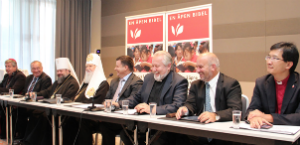Christian, Jewish, and Muslim representatives had been
brought together by the Norwegian Bible Society in an attempt to foster mutual acceptance and understanding in the midst of the conflict engulfing their respective countries.

After three days of talks a communiqué was issued which stressed the need to continue an ‘in-depth dialogue’.
The communiqué made clear that there were differences of opinions to the causes of the current crisis. However, the representatives all have a joint goal ‘to be witnesses to the truth and to contribute to peace’.
It concluded, ‘We evaluate our meeting very positively, and we think that it is necessary to continue to develop in-depth dialogue between representatives of religious communities of Russia and Ukraine, especially with the goal of overcoming negative consequences of the present situation both inside Ukraine and in the relationship between our countries.
‘We understand that this communiqué does not encompass all issues that were discussed during the meeting, neither all the problems that need to be resolved. Therefore, we are willing to continue our dialogue for the sake of achieving mutual understanding and strengthening of brotherly relationship between our nations.’
A number of Baptists were represented. They included Vitaly Vlasenko (Moscow), Director of External Church Relations for the Russian Union of Evangelical Christians-Baptists.
He described the meeting as ‘a very good beginning, but not yet a breakthrough.’
‘We had gathered together and now we are together. We have stated clearly that we regard each other as brothers in Christ.’
He added, ‘After the big let-down following the (strictly Protestant) Ukrainian-Russian meetings in Jerusalem on 10 April, this new spirit is significant.’
The Russian Baptist Union, in contrast to the Ukrainian one, had not been represented in Jerusalem.
Mr Vlasenko conceded that the war is experienced much differently in Eastern Ukraine than in distant Moscow.
‘Sometimes we don’t really know what was going on – information is often partial. But it is not our task to assign amounts of guilt. We must bind up the wounds of the hurting and communicate to our governments our longing for peace.’
The Ukrainian Baptist Union was represented in Oslo by
Gregori Komendant and Igor Bandura, while Mr Vlasenko was joined by Sergei Debelinskiy. Terje Aadne from the Baptist Union of Norway was also in attendance.
One the conference participants was Oleksandr Pavenko, pastor of the Transfiguration Church in Slavyansk. Two of his sons were among the four young Pentecostals killed by rebels on 9 June.
Through their communiqué, the leaders appealed to all participants of the conflict not to allow, under any circumstances, actions that would lead to humiliation of human dignity, use of torture, kidnapping (including those for the sake of ransom) and looting.
They continued, ‘As religious leaders we want to pay special attention to the need to ensure the freedom of religion in the war zone. Any violence committed toward clergy and lay people, religious buildings and houses of prayer of any denomination existing in Donetsk and Luhansk regions, are not permissible.’